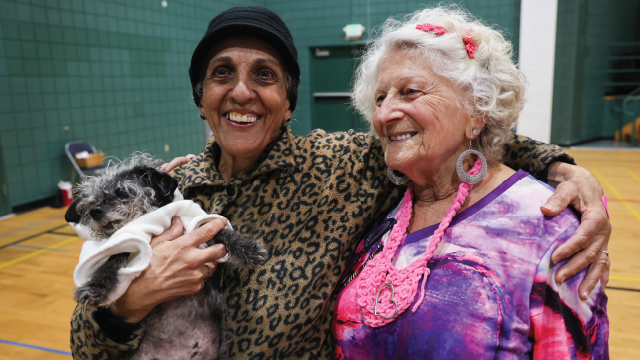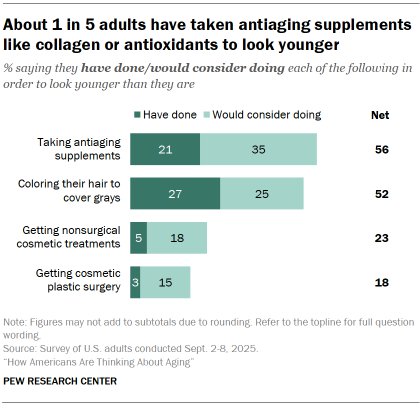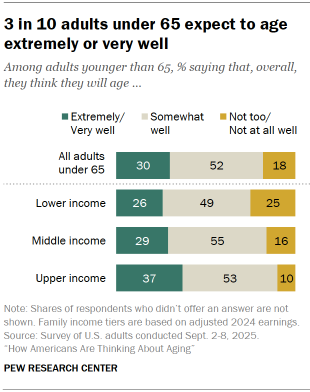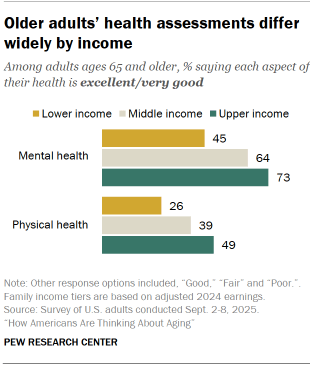
The U.S. population is aging rapidly. From 2004 to 2024, the share of Americans ages 65 and older increased from 12.4% to 18.0%, according to the U.S. Census Bureau. This is due in part to the country’s declining birth rate and increased life expectancy, but also because Baby Boomers – whose generation is defined by the increase of births in the U.S. following World War II – are now well into their 60s and 70s.
Against this backdrop, we surveyed 8,750 U.S. adults from Sept. 2 to 8, 2025, to understand how they’re thinking about aging:
- How are things going for older Americans as they age?
- What do younger adults think life will be like in their later years?
- Are there aspects of aging that Americans think people can control?
- What have Americans done, or what would they consider doing, to look younger than they are?
This research is part of our ongoing effort to study how the U.S. is changing socially and demographically and how the public is reacting to these changes. It also builds on our previous work about older adults and aging.
Key takeaways:
- Perceptions of aging: 49% of adults ages 65 and older say they are aging extremely or very well. By comparison, 30% of those younger than 65 expect to age similarly well. Among those in the younger group who say they think about what life may be like in their 70s and beyond at least sometimes, more are worried about their later years (67%) than excited (51%).
- Income and the aging experience: Among adults ages 65 and older, experiences with getting older differ vastly by income. About six-in-ten older adults in the upper income tier (61%) say they’re aging extremely or very well. This compares with 51% of those in the middle income tier and 39% of those in the lower income tier. Older adults in the upper income tier are also more likely to rate their physical and mental health highly, to spend time pursuing hobbies and socializing with friends extremely or very often, and to be active in a civic group or interest club.
- Aging and financial concerns: More than four-in-ten U.S. adults under 65 (45%) aren’t confident they’ll have enough income and assets to last through their retirement years or say that they won’t be able to retire at all. Among those who are worried when they think about what their life will be like in their 70s and beyond, financial concerns are one of the most commonly cited reasons for this feeling.
- Control over aging: More Americans say people have control over their physical health and mobility as they grow older than over their mental sharpness or how old they look. Three-in-ten say people have at least a fair amount of control over the aging process overall, with adults ages 65 and older among the most likely to hold this view (40%).
How much control do people have over the aging process?

A majority of Americans think people have a great deal or a fair amount of control over:
- Their physical health (67%)
- Their physical mobility (60%)
Fewer than half say people have at least a fair amount of control over:
- Their mental sharpness (47%)
- How old they look (38%)
When asked what age they would want to live to if they had a choice, most Americans (76%) say they would want to live until at least 80, including 29% who say they would want to make it to 100. On average, Americans say they want to live to be 91 years old.
What steps have Americans taken to look younger?

While fewer than half of U.S. adults think people have a lot of control over how old they look as they age, about half or more say they have done or would consider doing the following to look younger than they are:
- Taking antiaging supplements, such as collagen or antioxidants (56%)
- Coloring their hair to cover grays (52%)
About a quarter (23%) have gotten or would consider getting nonsurgical cosmetic treatments such as Botox, dermal fillers or laser therapies. And 18% have gotten or would consider getting cosmetic plastic surgery.
Differences by gender
Women are far more likely than men to say they have done or would consider:
- Taking antiaging supplements (66% vs. 46%)
- Coloring their hair to cover grays (73% vs. 29%)
- Getting nonsurgical cosmetic treatments (33% vs. 13%)
- Getting cosmetic plastic surgery (26% vs. 10%)
Read more about measures to look younger.
What adults under 65 expect from their later years
Three-in-ten U.S. adults under 65 think they will age extremely or very well. Most (78%) say they are actively taking steps in their daily life to improve their chances of aging well. These findings don’t vary much among adults ages 18 to 29, 30 to 49 and 50 to 64.

People in the upper income tier are the most likely to say they expect to age extremely or very well (37%). In turn, those in the lower income tier are the most likely to predict they won’t age well (25%).
When we asked adults under 65 how often they think about what life will be like in their 70s and beyond, 60% say they think about it at least sometimes, including 18% who think about it often.
Among those who think about it at least sometimes, more say they are worried about life in their later years (67%) than say they are excited (51%). About three-in-ten (28%) are both worried and excited.
What are people worried and excited about as they think about aging?
We asked people under 65 to explain, in their own words, what they are worried or excited about as they think about life in their 70s and beyond.
These findings are based on those who say they think about their later years at least sometimes and are at least somewhat worried or excited when they think about it.
Among those who feel worried, the top answers concern:
- Health, including physical and mental health (42%)
- Finances, including concerns about the future of Social Security (30%)
- Family relationships, including loneliness, losing loved ones or becoming a burden (16%)
Among those who feel excited, the top answers focus on:
- Having more time to spend with family and friends (42%)
- Having more time for activities and travel (30%)
- Retiring and not having to work (19%)
Concerns about finances were echoed in a separate question that asked U.S. adults of all ages how confident they are that they will have enough income and assets to last throughout their retirement years.
Read more about Americans’ financial concerns as they age.
How things are going for older Americans
Most Americans ages 65 and older feel positive about key aspects of their lives:
- 60% rate their mental health as excellent or very good.
- 66% say they feel optimistic about their life all or most of the time.
- 70% say they have people they can turn to for support all or most of the time.
Still, they report facing challenges. Fewer than half (37%) rate their physical health as excellent or very good, and shares of roughly one-in-six or more say:
- They feel lonely or isolated from others at least sometimes (35%)
- They experience mental confusion or memory loss at least sometimes (24%)
- It is difficult for them to carry out everyday activities, like walking, climbing stairs or carrying groceries (22%)
- They need help handling their affairs or caring for themselves at least sometimes (16%)
Some of these challenges are more common among those in their 80s and older. Within this older group, 31% say they experience mental confusion or memory loss and 24% say they need help handling their affairs or caring for themselves at least sometimes.
How experiences differ by income

In many ways, the experiences of older adults differ widely by income. For example, 49% of those ages 65 and older in the upper income tier say their physical health is excellent or very good, and 73% say the same about their mental health. These shares drop to 26% and 45%, respectively, among older adults in the lower income tier. Those with upper incomes are also more likely to say they spend time pursuing hobbies or socializing with friends extremely or very often.
Read more about:




